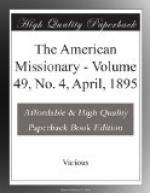Mr. Douglass is among the last survivors of that band of Abolitionists that were so potent in their influence in arousing the nation to the evils of slavery. The recent death of Theodore D. Weld, in his ninety-first year, recalls a name now almost forgotten, but that two generations ago indicated the foremost orator in the anti-slavery ranks. The poet of anti-slavery, Whittier, has gone recently, and now the most conspicuous name left of that noble band is that of Mrs. Harriet Beecher Stowe.
The American Missionary Association has reason to congratulate itself that its last annual meeting was made memorable by the presence of Mr. Douglass, and its vast audience stirred most deeply by his eloquent address. In that address he expressed his gratitude for himself and his people for the work done by the Association in their behalf. And in a letter subsequently addressed to the senior secretary of the Association, he says, in speaking of that address: “I am very glad to have been able thus publicly to record my sense of the value of the great work of the Association in saving my people. I am a friend of free thought and free inquiry, but I find them to be no substitute for the work of educating the ignorant and lifting up the lowly. Time and toil have nearly taken me from the lecture field, but I still have a good word to say in the cause to which the American Missionary Association is devoted.”
ITEMS.
Of the twelve millions of families now in the United States, it is said that one million cannot secure the needed work to procure the luxuries and comforts of life. On this basis the one and a half millions of colored families are at a special disadvantage. They have to contend not only against the hard times, but against the immense disadvantages of race prejudice.
* * * * *
The appointment of Bishop Whipple, of Minnesota, to be a member of the Board of Indian Commissioners was an appointment eminently fit to be made. Few men in this country stand higher in their knowledge of the Indians and their wants, or have shown a more intelligent and self-sacrificing interest in their behalf.
* * * * *
The Indian Territory, occupied by what has been regarded as the Civilized Tribes, is in a precarious position. The recent investigation by the Committee under ex-Senator Dawes has brought out the facts in startling distinctness. The recommendations of the Senator are very clear and radical, but it is feared that delay in the settlement of the question will only protract and aggravate the difficulty.
* * * * *
The “Missing Link” has been discovered. It was found, we are told, in some fragments of skeletons dug up somewhere in Java. What an attraction this will be to lead scientific doctors to neglect living beings and wrangle over these old bones. In this country the real “Missing Link” is that charity on the part of the white people that recognizes the colored man as a fellow-citizen and a fellow Christian. Let that link be found and burnished up and a good many serious problems will be solved.




